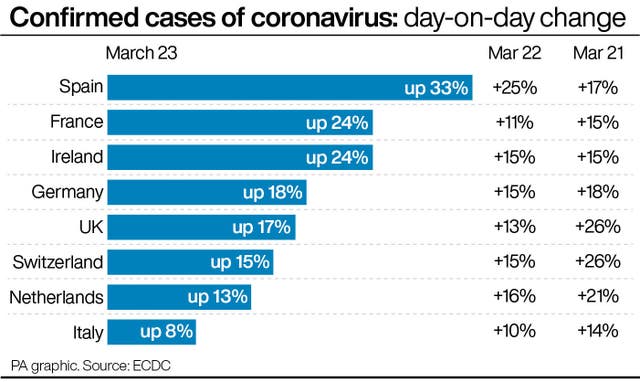
NHS nurses in Australia trying to get home and rejoin UK hospitals amid the coronavirus crisis have accused the Government of “turning their backs” on them.
Laura Mclaughlin, who has lived in Sydney for three years, organised a Facebook group of almost 50 NHS staff, which is “rapidly growing” with professionals pleading for information about return flights.
As she is dual-registered and still maintains an NMC pin in the UK, Ms Mclaughlin told the PA news agency she would be able to start working in a hospital “almost immediately”.

“Technically, if I walk off that plane then I can pretty much start working,” the 27-year-old, from Preston, said.
“Obviously I might need to self-isolate and I’m trying to get advice from the Government in regards with what to do.
“A lot of people have spent a lot of money to move here and live here for a few years, so it’s a big risk to give up everything we have set up here.
“But it just feels right. As soon as I saw the pandemic becoming an issue, I thought I need to be at home, in the NHS, helping my colleagues and being closer to my family.”

Ms Mclaughlin, who worked as an accident and emergency nurse in a hospital in Southport, Merseyside, said she had been in contact with former colleagues in the UK about returning to work.
They have said they are “so short-staffed” they need as much help as possible, she added.
She managed to secure a flight from Darwin to Heathrow, avoiding transport hubs such as Singapore and Dubai which are preventing passengers travelling through the airport.
But she said a number of NHS staff, including doctors and physiotherapists, are still searching for a route back to the UK.
“We’ve been to the embassy, trying to get hold of people to help us, but we’re just getting no answers,” Ms Mclaughlin told PA.
“I don’t think it’s good enough. We need to be prioritising flights for the NHS key workers to be getting home to be helping the pandemic.
UK nationals in Australia: we are setting up a way for you to provide your contact details to us. We will be able to communicate with you directly, including updates on commercial flight availability to the UK. It will go live today.
— UK in Australia 🇬🇧🇦🇺 (@ukinaustralia) March 24, 2020
“I have hopefully got this flight confirmed for tomorrow, but it’s still helping all the other people along the way trying to get home.”
She said one-way flights to the UK were costing upwards of 13,000 dollars (£6,600), adding: “As nurses, we don’t have that sort of money to be able to book a flight and get home.
“We’re really keen to come and help but we’re all feeling a little bit like everyone has turned their back on us at the moment.
“It’s such a long way to be stuck with no flights with no help from the embassy or the Government.”
Ms Mclaughlin said bringing back nurses from retirement was “fantastic”, but said there were young nurses around the world who want to return to help the NHS.
Paramedic Ned Starling, who has worked for London Ambulance Service for five years, said he spent all day on Tuesday at Sydney International Airport searching for flights.

The 28-year-old, who has been travelling around Australia for three months with his girlfriend, who is a nurse, said he was in a Facebook group with another 500 NHS workers looking to get back from Australia.
“If there’s any way of just promoting this idea that if there is repatriation, there’s a whole bunch of useful people that are willing to come back now, as soon as possible, to work,” he told PA.
“I personally feel that these are people that need to be back in the country.
“My reason for wanting to come back is really because I want to provide some help at home.”
A spokeswoman for the Foreign and Commonwealth Office (FCO) said: “We recognise British tourists abroad are finding it difficult to return to the UK because of the unprecedented international travel and domestic restrictions that are being introduced around the world – often with very little or no notice.
“The FCO is working around the clock to support British travellers in this situation to allow them to come back to the UK.”
She said the Government was seeking to keep “key transit routes” open as long as possible, while consular staff are supporting those abroad with urgent need.


Comments & Moderation
Readers’ comments: You are personally liable for the content of any comments you upload to this website, so please act responsibly. We do not pre-moderate or monitor readers’ comments appearing on our websites, but we do post-moderate in response to complaints we receive or otherwise when a potential problem comes to our attention. You can make a complaint by using the ‘report this post’ link . We may then apply our discretion under the user terms to amend or delete comments.
Post moderation is undertaken full-time 9am-6pm on weekdays, and on a part-time basis outwith those hours.
Read the rules here